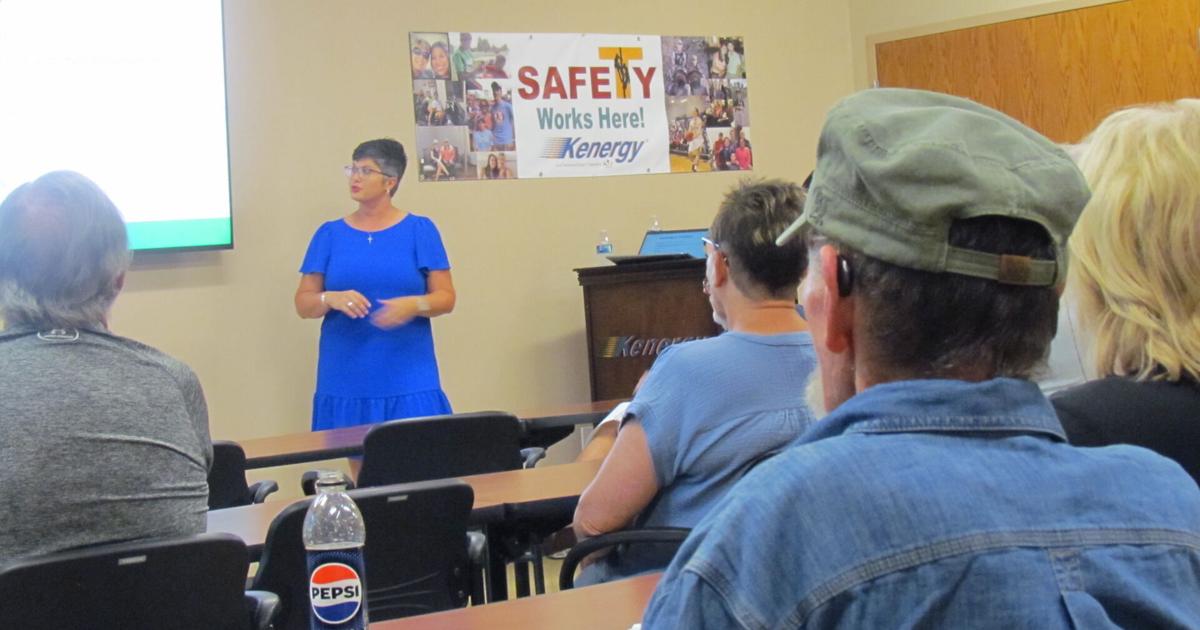MARION — Broadband expert and Conexon Development Manager Leslye Krampe and multiple Kenergy representatives hosted a public meeting in Marion, Kentucky, to discuss all things broadband and provide updates on Kenergy’s fiber project in west Kentucky.
Krampe said Kenergy has grown to serve more than 59,000 homes throughout Kentucky following its partnership with Conexon to build a 7,200-mile fiber-to-the-home network, which many rural areas are still in dire need of.
Though there has been heavy concentration in Daviess County, Krampe focused on current and future fiber installation with Conexon in Caldwell, Crittenden, Hopkins, Livingston and Lyon counties.
As of June 23, 2025, Kenergy has had 3,200 miles of fiber installed, 11,500 poles worked, 11,900 connected members and 74 to 80 contractors working on the project in Kenergy-Conexon territories. Krampe spoke at length about opportunities for future potential recipients, their pricing plans, as well as obstacles in receiving funding.
“You may be asking, why does an electric co-op want to get into the fiber business?” Krampe said. “The same reason that co-ops were created in the 30s. No one else was going out to that last house to install electricity a mile out. No one was serving that user. They were kind of looking at the dense areas and forgetting about all of the rural areas. That is why co-ops are well positioned. They have the infrastructure, the poles and the wires there. It is easy for a company like Conexon to come in and just follow the electric utility.”
In 1930s rural America, nine out of 10 homes were without electric service until the middle of the decade. That’s when the government invested in nonprofit and rural electric co-ops, which enabled rural homes to eventually have electricity. This same concept can now be applied to Kenergy’s co-op with Conexon.
Krampe explained the benefits of Kenergy partnering with Conexon, saying when Conexon works with an electric company, the fiber is used to, firstly, provide service to the members. However, it is also used for the electric system. An electric co-op gathers data from each meter, which sends that data back to the co-op wirelessly. Krampe said by doing this, Kenergy is going to be “light years ahead” in terms of technology when this project is complete.
On an infrastructural level, utilities are positioned in a way to support broadband, since it already has the infrastructure required for installation.
“A lot of the co-ops would love to have a fiber network, but it is too costly,” Krampe explained. “So, by doing the broadband project, you can offset some of that cost as well. Of course, they are stepping up to provide services for the co-op members, such as telehealth, online education, remote work options. They are actually coming in and saying, ‘we want to do this for our community, to make our community stronger.’ ”
Krampe then discussed Kenergy’s project, in terms of scope and size. She said this is one of the biggest and fastest growing projects in the US currently. With the electric co-ops, Conexon promises to serve 100% of the membership, and if you are a user of Kenergy or other partnering electric companies, you will eventually have their service.
Since 2018, Conexon has been working to bring fiber to these rural communities. The process has not been easy, according to Krampe, even requiring laws to be changed in order to implement co-ops for fiber installation in rural areas.
“The feasibility study from Conexon was presented to Kenergy’s board in February of 2020. We found out in 2018 that the Kentucky law did not allow for an electric cooperative to provide any other service to its members besides electricity,” Krampe said. “So, we had to go and change the law. Finally, it got changed in 2021. In August of 2022, Kenergy publicly announced the fiber project. That’s when things got started. The first Kenergy member received service within six months of when they received broadband.”
Krampe addressed the crowd directly, asking about their download speeds with their current internet providers. Nearly all attendees said their service was slow, with one even remarking “it stinks.” One said Mediacom was fast, but very expensive. Krampe said fiber speeds will be significantly faster, and the packages will be cheaper. She said what Conexon offers is comparable to service in cities like Atlanta and Nashville.
Though the installations are moving along, there are still some hurdles on the federal level. Krampe explained how Kenergy and Conexon applied for funding from the Federal Communication Commission and received it in two categories. However, they now need another round of Broadband Equity Access Deployment (B.E.A.D.) funding. Conexon applied for B.E.A.D., and on June 6, she said the Commerce Department in Washington, D.C., said it was “scrapping the program and going to redo it.” So, they now have to reapply. That has halted installation in some areas.
“This B.E.A.D. program is $42.5 billion across the US. Kentucky has $1.1 billion for the deployment of broadband,” Krampe said. “As Kenergy and Conexon apply for this money, we are going to be trying to get as much federal funding that we can, so Kenergy does not have to go out and borrow money or pay for more of this project. The B.E.A.D. program is super important to Kenergy and Conexon right now. We have had to quit building in some areas, because if you go ahead and build, then you can’t get funding for them.”
However, even if it has not been approved, they will still build out Kenergy’s program. She said Conexon has to build strategically. If the funding had already come through, the project would be moving ahead more swiftly. Though the timeline and a completion date have not yet been fully defined due to those issues, Conexon is taking applicants for fiber installation in the future. Those interested can call Conexon at 1-844-542-6663 or visit conexonconnect.com.
